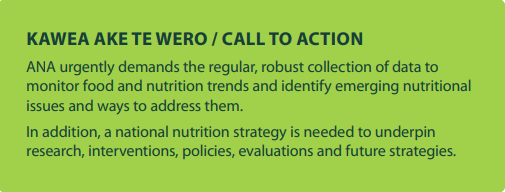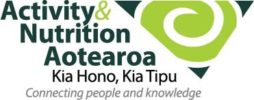02 Nov Kawea ake te wero: Enabling everyone in Aotearoa to eat well
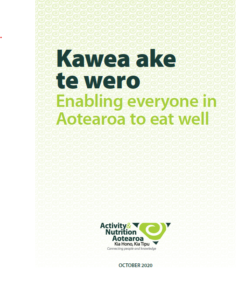 Everyone in Aotearoa New Zealand has a right to live, grow, learn, and work in an environment that provides access to healthy, affordable, and safe food. ANA is a national organisation with a vision that everyone in New Zealand can and does eat well and leads an active life.
Everyone in Aotearoa New Zealand has a right to live, grow, learn, and work in an environment that provides access to healthy, affordable, and safe food. ANA is a national organisation with a vision that everyone in New Zealand can and does eat well and leads an active life.
ANA is often asked, what is the current nutritional status of people living in Aotearoa?
These issues papers, for the first time, collate the latest research in one place. Together they give an integrated picture covering selected nutrition issues in three papers.
What is the challenge?
There are many challenges in achieving healthy diets for all. In New Zealand, people have differences in health that are not only avoidable but inequitable.
To achieve equitable health outcomes, different people with different levels of advantage require different approaches and resources. Access to healthy food is a key factor in the inequity of nutrition of the population.
Obesity rates in both children and adults are well documented. New Zealand has the third highest adult obesity rate in the OECD, and our rates continue to increase. However, while there has been emphasis on obesity rates in the past, ANA wishes to draw attention to other aspects of nutrition and public health that massively affect the population’s quality of life.
Inadequate nutrition disproportionately affects Māori and Pacific populations and children living in socio-economically deprived neighbourhoods. The consequences are far-reaching. A healthy diet not only addresses nutrient deficiencies, it reduces the risk of illnesses such as diabetes, cancer, obesity and cardiovascular disease. Specific foods and eating patterns are also more likely to support emotional and mental health. Productivity is improved in the workplace and at school students who eat well do better in class.
ANA believes all people living in Aotearoa should have access to affordable, nutritious food that they recognise as being of their culture.
What are the key issues?
The first paper Food and Nutritional Issues in Aotearoa outlines some of the factors contributing to population food choices and the barriers to healthy eating patterns and overall health. It considers the socio-economic determinants of nutrition, especially the impact of food security and culture.
It outlines what is known about food consumption and diet-related risk factors and notes significant gaps in the available data.
The paper considers nutrition for different life stages. A life course approach to nutrition in Aotearoa prioritises maternal and childhood health for the first 1,000 days as this is known to affect chronic disease risk and health outcomes in later life. Other key groups are children and older people.
One of the main factors contributing to food choices is unhealthy food and drink environments. This paper includes research about sustainable diets, food systems, food labelling and food and beverage marketing (particularly to under 18s).
Finally, consideration is given to the role of the public health nutrition workforce and the need for workforce development.
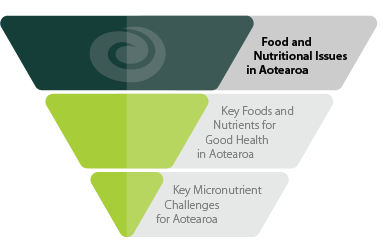
The second paper Key Foods and Nutrients for Good Health in Aotearoa discusses the main diet-related risk factors to demonstrate the importance of healthy food and nutrition for population health and wellbeing and prevention of ill health. It includes key facts related to Long-Term Conditions that have nutrition as a common risk factor, such as coronary heart disease, diabetes, cancer, obesity and mental health. It considers some of the common issues that impact on population health, such as high sodium, lack of fruit and vegetables, high saturated fat, alcohol intake and high sugar.
The paper on key foods and nutrients concludes that much of the high health loss due to long-term conditions among those living in Aotearoa is preventable with lifestyle behaviours including healthy dietary patterns. Improving the socioeconomic determinants of health will have the greatest impact on reducing inequities for our most vulnerable populations.
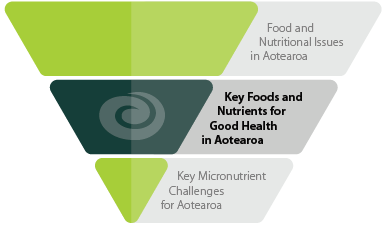
The third paper Key Micronutrient Challenges for Aotearoa summarises data on vitamins and minerals of concern in the New Zealand diet. Monitoring specific nutrients at a population level is important to prevent and control dietary deficiencies and associated health Implications. This paper describes micronutrients – iron, calcium and Vitamin D, iodine, selenium, zinc, and Vitamin B12 – that are suboptimal in the New Zealand diet.
It concludes with the need to strengthen food and nutrition monitoring including reinstating regular food and nutrition surveys; placing greater emphasis on collecting data on Māori and Pacific woman and children’s nutritional status; monitoring specific nutrients of concern in the New Zealand diet; and surveying the prevalence of plant-based diets and the potential nutrition risks.
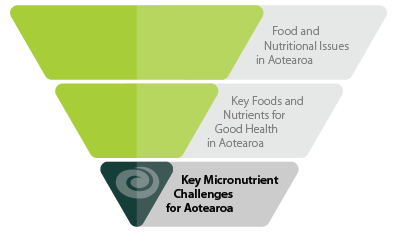
What can be done?
ANA calls for all stakeholders, including government, to come together to improve access to healthy food for everyone living in Aotearoa. Two overarching key issues are the lack of up-to-date data; and the lack of a National Nutrition Strategy to provide a framework and action plan for many of the issues raised in these papers.
Together we must:
- Strengthen food and nutrition monitoring including:
- food security, food consumption, nutrient status
- priority for Māori and Pacific populations
- key nutrition issues, particularly for pregnant and breastfeeding women, children and older adults
- nutrients of concern in the New Zealand diet
- the prevalence of plant-based diets and the potential nutrition risks
- enabling appropriate policies and interventions
- Develop a National Nutrition Strategy to include:
- food security and the social determinants of health, prioritising cultural values
- regulations, policies and incentives to create healthier food environments, including government-led regulation about marketing unhealthy food to under 18s
- research about sustainable diets and inclusion of plant-based diets in the Healthy Eating Guidelines
- an analysis of local food systems
- a workforce development strategy for public health nutrition
- co-ordinated action into addressing and improving the key issues raised in these three papers
